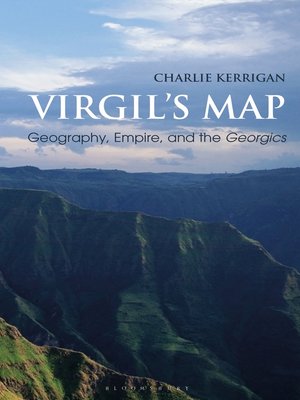Virgil's Map
ebook ∣ Geography, Empire, and the Georgics · Bloomsbury Studies in Classical Reception
By Charlie Kerrigan

Sign up to save your library
With an OverDrive account, you can save your favorite libraries for at-a-glance information about availability. Find out more about OverDrive accounts.
Find this title in Libby, the library reading app by OverDrive.



Search for a digital library with this title
Title found at these libraries:
| Library Name | Distance |
|---|---|
| Loading... |
Virgil's Georgics depicts the world and its peoples in great detail, but this geographical interest has received little detailed scholarly attention. Hundreds of years later, readers in the British empire used the poem to reflect upon their travels in acts of imagination no less political than Virgil's own. Virgil's Map combines a comprehensive survey of the literary, economic, and political geography of the Georgics with a case study of its British imperial reception c. 1840–1930.
Part One charts the poem's geographical interests in relation to Roman power in and beyond the Mediterranean; shifting readers' attention away from Rome, it explores how the Georgics can draw attention to alternative, non-Roman histories. Part Two examines how British travellers quoted directly from the poem to describe peoples and places across the world, at times equating the colonial subjects of European empires to the 'happy farmers' of Virgil's poem, perceived to be unaware, and in need, of the blessings of colonial rule.
Drawing attention to the depoliticization of the poem in scholarly discourse, and using newly discovered archival material, this interdisciplinary work seeks to re-politicize both the poem and its history in service of a decolonizing pedagogy. Its unique dual focus allows for an extended exploration, not just of geography and empire, but of Europe's long relationship with the wider world.
Part One charts the poem's geographical interests in relation to Roman power in and beyond the Mediterranean; shifting readers' attention away from Rome, it explores how the Georgics can draw attention to alternative, non-Roman histories. Part Two examines how British travellers quoted directly from the poem to describe peoples and places across the world, at times equating the colonial subjects of European empires to the 'happy farmers' of Virgil's poem, perceived to be unaware, and in need, of the blessings of colonial rule.
Drawing attention to the depoliticization of the poem in scholarly discourse, and using newly discovered archival material, this interdisciplinary work seeks to re-politicize both the poem and its history in service of a decolonizing pedagogy. Its unique dual focus allows for an extended exploration, not just of geography and empire, but of Europe's long relationship with the wider world.







